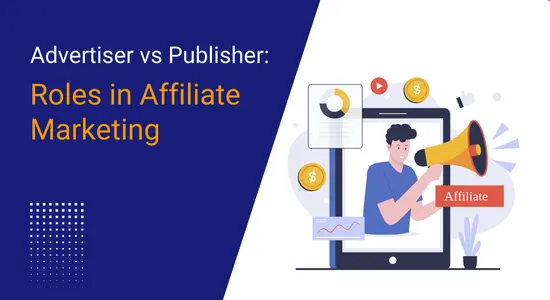Advertiser vs Publisher: Understanding the Two Roles in Affiliate Marketing
Affiliate marketing is one of the best ways for businesses to grow online with partnerships. Regardless of whether you are new to this area or trying to further your expertise, you need to understand the two roles: the advertiser and the publisher. In this blog post, we will describe the two roles, the differences between them, and how they collaborate to drive success in affiliate marketing.
Who is an Advertiser in Affiliate Marketing?
Advertiser is the person or company that wants to promote its products or services. Advertisers create affiliate programs and utilize terms that will be accepted, for example, commission rates and how they will pay commissions, etc. Advertisers that create affiliate programs provide their affiliates with marketing materials, such as images, links to products, product information, etc., to promote their products or services.
Advertisers might be working with an affiliate marketing agency or just utilize the best affiliate platform to manage, keep track of, and analyze their affiliate programs in the most time-efficient manner. The affiliate platforms help track sales, clicks, and commissions, giving the advertisers some transparency into the sales of their products through their affiliates and the ability to view and manage commissions.
Key responsibilities of advertisers include:
- Creating attractive affiliate programs.
- Providing promotional resources.
- Tracking performance and payment of commissions.
- Supporting affiliates with timely information
Selecting a good affiliate platform or agency can reasonably affect how well an advertiser can perform their program. A good platform facilitates smooth communication along with accurate reporting, which improves trust with publishers.
Who is a Publisher in Affiliate Marketing?
A publisher is either a person or an organization that promotes what the advertiser sells, be it services or goods. This is done through various publisher channels such as blogs, social media, email marketing, or through their website. A publisher earns a commission once someone purchases an item or takes an action via the publisher's unique affiliate link.
It's important for publishers to find programs where they advertise products that fit their audience and are of good quality. This establishes trust with their audience. When publishers work with a trustworthy affiliate marketing agency or affiliate platform, they will have the opportunity to maximize their earnings and find better opportunities.
Key responsibilities of publishers include:
- Creating engaging content to promote products.
- Driving traffic through different marketing channels.
- Monitoring their affiliate links and performance.
- Building trust with their audience.
How Advertisers and Publishers Work Together?
Affiliate marketing relies on a relationship between advertisers and publishers. Advertisers provide products and support, while publishers educate and sell additional products. To improve return-on-investment, it helps both parties be open, communicate effectively, and develop economic commission structures.
A good example of technology usage for an advertiser is the use of an affiliate platform to recruit publishers and provide data in real time related to the performance of the campaign. A good example of technology usage for a publisher is accessing an affiliate platform or an affiliate marketing agency to enroll in multiple affiliate programs, track their overall earnings, and optimize their own business.
Conclusion
Understanding the difference between an advertiser and a publisher in affiliate marketing can help both parties be more effective in their activities. The advertiser is focused on the offer and facilitating support to the publisher. The publisher is focused on selling products or services.
Working with the best affiliate platform, or through an affiliate marketing agency, will allow both the advertiser and publisher to access tools and resources to make their affiliate campaigns a little easier and more profitable. Whether you want to start your affiliate program or become a highly successful affiliate, knowing the difference is the first step to success.
Overall, affiliate marketing allows businesses and marketers to create a win-win opportunity. Both parties can educate themselves and their partners, allowing them to take advantage of their affiliate marketing programs, and at the same time ,create steady and incremental income.


 Categories
Categories

